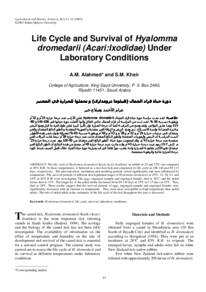Document
Life cycle and survival of hyalomma dromedarii (acari:Ixodidae) Under laboratory conditions.
Contributors
Kheir, S.M., Author
Publisher
Sultan Qaboos university
Gregorian
2003
Language
English
English abstract
The life cycle of Hyalomma dromedarii Koch (Acari:Ixodidae) on rabbits at 25 and 32ºC was compared at 85% R.H. At these temperatures, it behaved as a two-host tick and completed its life cycle in 108-146 and 80-115 days, respectively. The preoviposition, incubation and moulting periods varied significantly and were influenced by temperature. The survival periods of different developmental stages of Hyalomma dromedarii at 25ºC, 32, 38, 43, and 48ºC at 85% R.H. were investigated. The eggs, engorged nymphs and engorged females died at 38ºC, and the unfed larvae died at 43ºC. The longevity of the unfed adults decreased from 90-120 days at 25ºC to7-15 days at 43ºC. They died at 48ºC. These results suggest that the survival periods of eggs, engorged nymphs and engorged females were significantly decreased with an increase in temperature. They were more susceptible to high temperature than unfed adults. The role of unfed adult in the continuity of the life cycle of the tick throughout the year is discussed.
Member of
ISSN
2410-1079
Resource URL
Citation
Alahmed, A. M., & Kheir, S. M. (2003). Life cycle and survival of hyalomma dromedarii (acari:Ixodidae) Under laboratory conditions. Journal of Agricultural and Marian Sciences, 8 (1), 11-14.
Arabic abstract
لقد تمت دراسة دورة حياة قراد الجمال Hyalomma dromedarii على الأرانب عند درجة حرارة 25°م و 32°م ورطوبة نسبية 85%. لقد ثبت من الدراسة أن قراد الجمال ثنائي العائل وأنها أكملت دورة حياتها في 108 - 146 و 80 - 115 يوما على التوالي. ولقد وضح من الدراسة أيضا أن درجة الحرارة تؤثر تأثيرا كبيرا على طول فترة ما قبل وضع البيض وفترة الحضانة وفترة الانسلاخ. تم وضع البيض واليرقة غير المتغذية والحورية المتغذية والطور البالغ المتغذي وغير المتغذي في درجات حرارة 25°م و 32°م و 38°م و 43°م و 48°م ورطوبة نسبية 85% لمعرفة طول عمر هذه الأطوار. أثبتت الدراسة أن البيض والحوريات المتغذية والطور البالغ المتغذي ماتت عند درجة حرارة 38°م بينما ماتت اليرقات غير المتغذية عند درجة حرارة 43°م. وقد انخفضت دورة حياة الطور البالغ غير المتغذي من 90 - 120 يوم تحت درجة حرارة 25°م إلى 7 - 15 يوم عند درجة حرارة 43°م وقد ماتت عند درجة حرارة 48°م . يتضح من هذه النتائج أن الطور البالغ غير المتغذي هو الأكثر مقاومة للحرارة وأنه يلعب دورا هاما في استمرارية دورة حياة القراد خلال فصل الصيف عندما تكون درجة الحرارة عالية والرطوبة منخفضة.
Category
Journal articles

